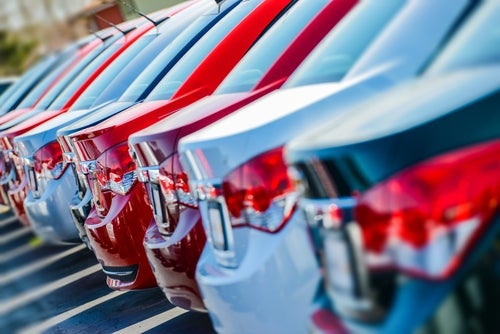
Cox Automotive has downgraded its new car forecast for the rest of 2021 due to supply issues, despite consumer demand being higher than expected. The revised forecast would see the year’s third quarter end on 522,425 new car transactions, down 17.7% on the 2000-2019 average.
The full 2021 forecast has also been adjusted downwards by 2.48% versus Cox Automotive ‘s April forecast. This scenario assumes that there will still be a modest demand throughout the summer, however supply issues are likely to persist.
Global car supply has dropped significantly during the pandemic due to manufacturers trying to adjust to new ways of working, fi supply chains and source materials for new car production.
Figures published by the Society of Motor Manufacturers and Traders (SMMT) earlier this month revealed new car registrations had fallen by 16.4 per cent last month, compared to a pre-pandemic June. There were 186,128 new cars were registered in total across the UK, and the decrease was compared to a 10-year June average.
Philip Nothard, insight & strategy director for Cox Automotive, offers a different viewpoint to the reasoning given by the SMMT on the fall, writing in the second quarterly issue of AutoFocus:
“We’re witnessing a perfect storm for the automotive industry. Most in the industry know about the shortages in semiconductors, aluminium price rises and rubber and plastics shortages. But additional issues such as manufacturers shifting their R&D and manufacturing capabilities towards EVs, and the implications of the Brexit transition period and delays are less discussed.
How well do you really know your competitors?
Access the most comprehensive Company Profiles on the market, powered by GlobalData. Save hours of research. Gain competitive edge.

Thank you!
Your download email will arrive shortly
Not ready to buy yet? Download a free sample
We are confident about the unique quality of our Company Profiles. However, we want you to make the most beneficial decision for your business, so we offer a free sample that you can download by submitting the below form
By GlobalData“To get around the challenges and the reliance of technology in vehicles today, manufacturers are refocusing the available materials towards their most popular and profitable models for the time being – EVs, hybrids and higher-margin vehicles such as SUVs and even their commercial vehicle divisions where there is increased demand, in favour of cheaper, less profitable and smaller city cars,” he wrote.
The supply issues are a global problem for the automotive industry, although the used car market is still seeing growth. Nothard added: “Arguably, the used car market has never had this much influence on the industry as a whole. Buyers are flocking towards used cars with money to splash after a largely inactive year, and dealers are enjoying an uplift in activity as a result. But this can only go on for so long, as supply isn’t there to meet demand.”
The effects of the lack of new car supply are being felt most by fleet and rental market companies who are extending contracts and utilising vehicles they already have rather than their typical vehicle replacement processes.
Nothard added: “Lack of nearly new stock means volumes are lower overall and are typically older and have higher miles, while average prices are rising as dealers compete for what little stock is available. Used car prices rises can only rise so far until the situation is unsustainable.
“We don’t expect new car supply shortages to be resolved until 2022, so the knock-on effects in the used car market will be around for some time yet. However, while trade price realignments are expected, we are unlikely to see a flood of vehicles into the used market, so the prospect of a significant drop in values is small.
“However, we must be careful that this doesn’t turn into a bubble, and keep fingers crossed that as we go into the autumn, we remain free of restrictions and that the economy bounces back as support programmes are removed.”







